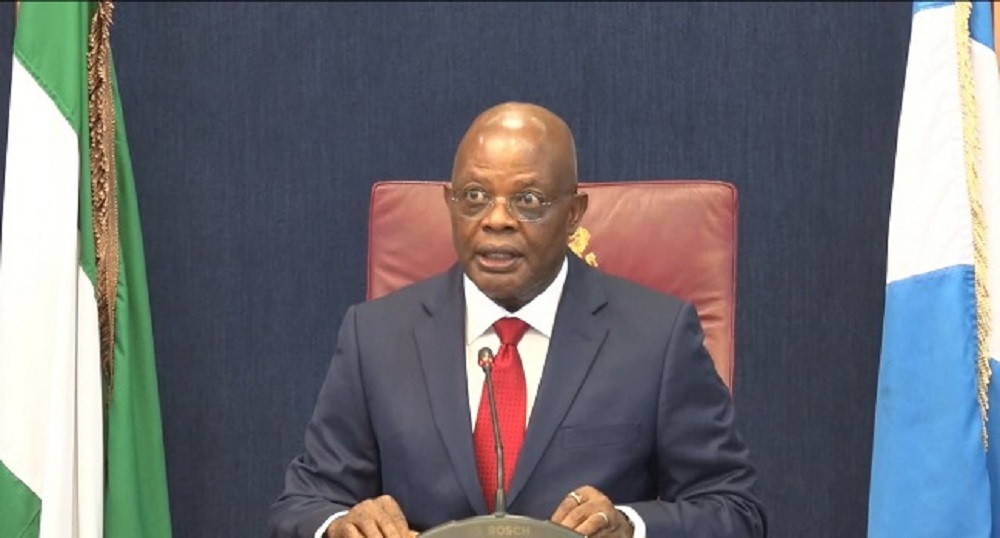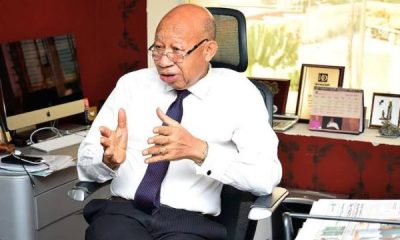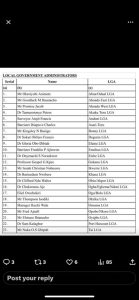News
Tripartite committee makes Minimum Wage recommendation to President Tinubu

The acting Minister of Labour and Employment, Hon. Nkiruika Onyejeocha has disclosed that the report of the Tripartite Committee on the new minimum wage submitted to President Bola Tinubu depicts a “balanced and realistic approach to addressing the myriad challenges faced by our workforce.”
She stated that, “These submissions are not just recommendations; they are a blueprint for actionable reforms that will drive sustainable improvements in labour conditions across the country.”
Hon. Onyejeocha disclosed this on Monday during a one-day retreat on ‘Labour reforms and the quest for living wage in Nigeria: A Focus on Legislative intervention’, organised by National Institute for Legislative and Democratic Studies (NILDS), for Chairmen and Members of joint Senate and House Committees on Employment, Labour and Productivity.
She emphasised the present administration’s resolve towards transforming the labour landscape in Nigeria, ensuring that every worker is respected, protected, and fairly compensated.
Hon. Onyejeocha said: “The Government of Nigeria, under the leadership of President Bola Ahmed Tinubu, is unwavering in its dedication to ensuring that all workers are treated with dignity, work in safe environments, and earn a living wage. Our vision is clear: to create a labour market that is fair, equitable, and capable of sustaining the aspirations of every Nigerian worker.
“Central to our efforts is the work of the Tripartite Committee comprising of Government, Organized Private Sector and Organized Labour, which has diligently engaged with stakeholders on the critical issue of a New National Minimum Wage.
“The Committee’s comprehensive submissions to Mr. President reflect a balanced and realistic approach to addressing the myriad challenges faced by our workforce. These submissions are not just recommendations; they are a blueprint for actionable reforms that will drive sustainable improvements in labour conditions across the country.
“One of the key initiatives of the Federal Ministry of Labour and Employment is the Labour and Employment Empowerment Program (LEEP). LEEP embodies our holistic approach to labour reform, with a specific pillar dedicated to labour reforms and labour compliance enhancement.
“This initiative aims to ensure that employers adhere strictly to the highest standards of occupational health and safety. By fostering a culture of compliance, we are not only protecting workers but also promoting a business environment that is conducive to productivity and growth.
“As we embark on these reforms, we are particularly focused on factories and industrial parks. These areas are critical to our industrial strategy and the well-being of thousands of workers. Our plan is to rigorously enforce safety standards and ensure that employers provide safe and healthy working conditions. This is not just about compliance; it is about creating workplaces where workers can thrive without fear of injury or exploitation.”
While acknowledging the role of legislative intervention, Hon. Onyejeocha underscored the need for the standing Committees saddled with the responsibility of legislative oversight and indeed the Parliament, to enact “laws that protect and empower workers are vital to the success of our reform agenda. Together, and as your colleague, we can do more and indeed, build a legal framework that supports our vision for a just and equitable labour market.
“Let us come together to sponsor and pass bills that reflects the yearnings of our labour force across all sectors. Let us indeed create laws and policies that not only foster productivity and growth amongst our workforce, but also commensurably punish offenders and violators of labour laws. This is the only pathway to true reform!
“In closing, I would like to reaffirm the Government’s unwavering commitment to labour reforms and the living wage. We are on a path to transforming the labour landscape in Nigeria, ensuring that every worker is respected, protected, and fairly compensated. This is our promise to the Nigerian people, and with your continued support, we will achieve it.”
Meanwhile, the NILDS Director General, Professor Olanrewaju Sulaiman who observed that the industrial relations atmosphere in Nigeria has been characterized by industrial disputes such as strikes, lockouts, and work stoppages, lamented that the situation “has a serious impact on worker productivity and national development, as no nation can develop in an atmosphere of crisis and work stoppages.
“This situation is further compounded by the recent harsh economic conditions of workers, which have been affected by many factors including inflation and high costs of living that have eroded workers’ welfare and weakened living standards. This situation calls for a review of the national minimum wage to ensure that workers’ conditions are improved following present-day realities.
“In the quest for a realistic national minimum wage, the Federal Government of Nigeria has constituted a tripartite national minimum wage negotiation committee, which is expected to come up with a realistic minimum wage rate that will improve the living conditions of Nigerian workers and motivate them for higher productivity.
“Indeed, any agreement reached by the tripartite negotiation committee must be submitted to the legislature for enactment. It is therefore imperative for the legislature to understand the processes of the minimum wage and its implications for worker welfare, economic growth, and the national development of the nation.
“The legislature must also have a holistic view of the environment under which labour administration is carried out in the country.
“It is in recognition of this fact that NILDS has organized this one-day national retreat. The retreat is most relevant as part of the NILDS contribution to the ongoing quest for a sustainable living wage that is capable of supporting the renewed Hope Agenda of President Bola Tinubu’s administration in Nigeria.
“In addition, this retreat is also relevant because the issue of the national minimum wage is on the exclusive list that can only be legislated upon by the National Assembly. The platform offered by this seminar will therefore equip members of the Committees and other stakeholders here present to share experiences that will culminate into a robust legislative intervention in the labour reform process.”
News
Japa: Nigeria loses $366m as 16,000 doctors move abroad

The Coordinating Minister of Health and Social Welfare, Prof Muhammad Pate said over 16,000 Nigerian doctors have left the country in the last five to seven years to seek greener pastures in other countries.
Prof Pate also said the doctor-to-population ratio is now 3.9 per 10,000 in the country, while the estimated cost of training one doctor exceeds $21,000.
This was as he lamented that nurses and midwives who left have also thinned the number of healthcare workers in the country.
The minister disclosed this at the seventh annual capacity building workshop of the Association of Medical Councils of Africa in Abuja on Tuesday with the theme, “Integrated healthcare regulation and leadership in building resilient health systems.”
According to him, an increasing number of Nigeria’s talented healthcare professionals aspire to work in other countries, driven by factors such as economic opportunity, better working conditions, more advanced training, and superior research environments abroad.
He said the migration of health professionals from developing countries is not new, but it has accelerated in recent years.
“In Nigeria alone, over 16,000 doctors are estimated to have left the country in the last five to seven years, with thousands more leaving in just the past few years. Nurses and midwives have also thinned in numbers. The doctor-to-population ratio now stands at around 3.9 per 10,000—well below the suggested global minimum.
“But this trend is not just about people leaving. It represents a fiscal loss.
The estimated cost of training one doctor exceeds $21,000—a figure that reflects the magnitude of public financing walking out of our countries. It deeply affects our health systems—leaving many of our rural communities critically underserved.”
He, however, emphasised that the phenomenon offers an opportunity to rethink and reshape the policies, to manage the valuable health workforce in ways that benefit our countries first and foremost.
“In Nigeria, guided by the vision of President Bola Ahmed Tinubu, who was appointed by African Heads of State as the AU’s Continental Champion for Human Resources for Health and Community Health Delivery—we are pursuing a new direction. His vision is that Nigeria becomes a prosperous, people-oriented country, contributing to a peaceful and thriving continent. Not a standalone Nigeria, but a Nigeria that is interlinked with all our neighbours and sister countries. Under the Renewed Hope Agenda, and within the framework of the Nigeria Health Sector Renewal Investment Initiative, we have embraced a new path—combining strategic realism with visionary ambition.
“The National Policy on Health Workforce Migration is a cornerstone of this path. It is designed to address health workforce migration with dignity—dignity for health workers, for the country, and for the profession. It is data-driven, evidence-guided, and signals a clear direction. This is not a restrictive policy, nor is it one born out of resignation. We understand that the global health workforce shortage is at 18 million, and countries in the Global North face their own human resource crises due to demography and other factors. But our response is based on stewardship—balancing the rights of health professionals to seek opportunities abroad with our duty to protect the integrity and viability of our national health system.
“The objectives are clear. To retain and motivate health workers currently serving in Nigeria—thousands of whom work under difficult conditions; to establish ethical norms and explore bilateral frameworks for recruitment, aiming to correct global asymmetries; to expand training capacity—not only for domestic needs, but to contribute to global workforce needs, to enable structured reintegration for the thousands of Nigerian professionals abroad; and to strengthen governance, improve regulatory coordination, and build real-time data systems.”
He urged Africa to lead in forging a new global compact on health workforce mobility—anchored in pan-African training and accreditation standards; shared planning tools, evidence, and data; continental negotiating platforms with destination countries; and sustained investments in the people who care for our people.
The President of AMCOA, Prof Joel Okullo, stressed the importance of collaboration among African countries to tackle healthcare challenges and improve regulation and leadership across the continent.
He expressed the belief that the outcome of the workshop would produce actionable strategies to improve healthcare services across Africa.
“This year’s theme highlights our commitment to tackling the diverse array of challenges within the health regulatory landscape. It seeks to empower AMCOA members and associate members with the wisdom and skills needed for informed strategic and operational decisions in the coming year.
“In this intricate regulatory tapestry, our discussions will illuminate strategies and insights that will bolster regulators’ capabilities. Our focus will revolve around managing health workforce mobility, improving credentialing and information data management systems
“Let us embark on this journey with enthusiasm and a shared sense of purpose. Our collaborative efforts today and over the next few days will lay the groundwork for transformative changes that will resonate across the healthcare landscape of Africa,” he noted.
The Registrar of the Medical and Dental Council of Nigeria, Dr Fatima Kyari, while welcoming participants to the event, noted that it was Nigeria’s first AMCOA workshop while commending the alignment of leadership towards the shared goal of patient safety.
The Board Chairperson of MDCN, Prof Afolabi Lesi highlighted the need for healthcare regulators to uphold global standards while adapting to local contexts.
Lesi, who is also the Chairman of the Local Organizing Committee for the workshop addressed the challenges of fragmented professional relationships that hinder implementation and compromise patient care.
“The reality is that while we have committed and clear directions at the level of governance, implementation of actions is bedeviled by the fractioned and fractious relationship among health workers who ought to be working as a team, with the patient (well-being and safety) as the primary focus of all our actions,” he said.
Photo caption: Members of AMCOA; the Registrar of MDCN, Dr Fatima Kyari; the Board Chairperson of MDCN, Prof Afolabi Lesi; the Coordinating Minister of Health and Social Welfare, Prof Muhammad Pate; the Minister of State of Humanitarian Affairs and Poverty Reduction, Dr Yusuf Sununu; and other AMCOA members.
News
SAD! Roof Collapses At Nightclub Kills 44, Including province Gov

The roof of the iconic Jet Set nightclub in Santo Domingo collapsed during a merengue concert, leaving at least 44 people dead and 160 injured.
The venue, which was filled with politicians, athletes, and other guests, became the site of devastation as rescue crews worked tirelessly to find survivors in the rubble, according to AP News.
Juan Manuel Méndez, director of the Centre of Emergency Operations, confirmed that search efforts continued.
“We presume that many of them are still alive, and that is why the authorities here will not give up until not a single person remains under that rubble,” he said.
Rescue workers spent hours clearing debris, determined to reach those trapped beneath the ruins.
By the afternoon, the death toll had risen to 44, with rescue teams still pulling survivors from the wreckage. Amid the chaos, the noise of drills and machinery filled the air as workers navigated through broken concrete and beams to save lives.
Among the victims was Nelsy Cruz, the governor of the northwestern province of Montecristi and sister of MLB All-Star Nelson Cruz. She had called President Luis Abinader at 12:49 a.m. to report that the roof had collapsed and she was trapped.
Cruz later died in hospital.
“This is too great a tragedy,” said First Lady Raquel Abraje, her voice choked with emotion.
Several notable figures were also injured, including former MLB pitcher Octavio Dotel, legislator Bray Vargas, and merengue singer Rubby Pérez, who was performing when the roof collapsed.
Pérez’s manager, Enrique Paulino, whose shirt was stained with blood, described how quickly the disaster unfolded.
“It happened so quickly. I managed to throw myself into a corner,” he said. “I initially thought it was an earthquake.”
The cause of the collapse remains unclear, with the nightclub expressing full cooperation with authorities. “The loss of human life leaves us in a state of deep pain and dismay,” the nightclub said in a statement.
As rescue operations continued, anxious family members gathered outside the venue, waiting for news of their loved ones. Manuel Olivo Ortiz, whose son had attended the concert, said, “We’re holding on only to God.”
Massiel Cuevas, the godmother of 22-year-old Darlenys Batista, was also waiting, firmly believing that Batista would be rescued.
“I’m waiting for her. She’s in there, I know she’s in there,” Cuevas said.
President Abinader shared his condolences on social media, stating that all rescue agencies were “working tirelessly” to assist those affected.
He later visited the scene, offering support to grieving families. “We have faith in God that we will rescue even more people alive,” Abinader told reporters.
Authorities urged the crowd to allow ambulances and rescue workers to do their jobs. At a nearby hospital, officials read aloud the names of survivors, while the National Institute of Forensic Pathology displayed photos of victims to help identify them. The search for survivors continues as hope remains.
News
Ibas picks administrators for 23 Rivers LGs(SEE list)

The Sole Administrator of Rivers State, Admiral Ibok-Ete Ibas [retd], said the federal government had released withheld local government allocations.
Rivers State Sole Administrator Vice Admiral Ibok-Ete Ibas (retd.) has appointed administrators to temporarily take charge of the state’s 23 local government areas.
Ibas also approved the constitution of some boards of agencies, commissions, and parastatals, which he earlier suspended.
The approval was contained in a Special Government Announcement issued on Wednesday morning by the Secretary to the State Government, Prof. Ibibia Worika.
Though the names of the new appointees were not listed, the statement said the appointments took immediate effect.
It reads, “His Excellency The Administrator of Rivers State, Vice Admiral (Retd) Ibok-Ete Ekwe Ibas CFR, has approved the appointments of administrators for the 23 Local Government Areas of Rivers State.
“He has also approved the reconstitution of some boards of agencies, commissions, and parastatals, earlier suspended.
“All appointments take effect from Monday, the 7th of April 2025.”
This comes less than 24 hours after a Federal High Court sitting in Port Harcourt reportedly restrained Ibas from appointing administrators to oversee the affairs of the local government councils.
The order was issued by Justice Adam Muhammed on Tuesday in suit no. FHC/PH/CS/46/2025 in the case filed by PILEX Centre for Civic Education Initiative led by Courage Msirimovu against the Sole Administrator in his official capacity.
Last week, the sole administrator suspended all heads of ministries, departments, and agencies in the state with immediate effect.
Ibas also cancelled all pending procurement and tender processes carried out by ministers, departments, and agencies in the state.
He said the cancellation became necessary following the Supreme Court judgment and the absence of an appropriation law within the period.
The sole administrator, according to a previous statement also issued by the SSG, directed all MDAs that carried out such tender processes for projects in their respective offices to refund such fees to the respective contractors immediately.
-

 News14 hours ago
News14 hours agoOERAF held memorial lecture on conflict resolution, security/safety of community in Nigeria
-

 News24 hours ago
News24 hours agoJust in: Founder of Diamond Bank and ex-chairman of MTN, Paschal Dozie is dead
-

 News19 hours ago
News19 hours agoTRADE WAR! U.S. angry over Nigeria’s import ban on 25 products
-

 Sports24 hours ago
Sports24 hours agoReal Madrid keeping tabs on Victor Osimhen
-

 News20 hours ago
News20 hours agoINTERVIEW: Introduction of Child Rights Curriculum In Nigerian Universities Will Take CRA to Families – Dr Obiorah Edogor
-

 News24 hours ago
News24 hours agoOERAF Executive Director Dr Akpodiete, Held Memorial lecture on Essence and benefits of health insurance+Photos
-

 News14 hours ago
News14 hours agoHoR Minority Caucus decries killings in Plateau, Benue states, urges immediate presidential decisive actions
-

 News6 hours ago
News6 hours agoBandits have seized control of 64 communities in Plateau – Gov Muftwang







